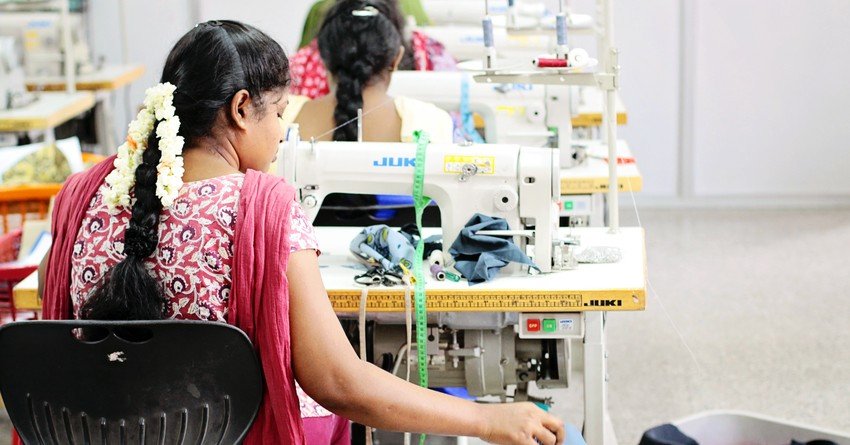Ethical clothing entrepreneur talks best practice and fast fashion brands’ ‘thinly veiled guises’ to be sustainable

Little Yellow Bird was founded by Jones and Hannah Duder in July 2015 and creates corporate clothing for local businesses as a way to help overseas workers with employment opportunities.
Jones says the idea was sparked from living in and traveling through developing or third-world countries, as she realised how many opportunities Kiwis have in comparison.
“I had been traveling through India and met a girl that couldn’t afford to stay in school and understood a really small amount of money from my perspective could change her life, so it inspired me to start a social enterprise,” she says.
Though Jones and Duder decided to delve into the clothing industry, Jones says their passion wasn’t in the fashion aspect of it. Rather, it was a way to support communities in an industry that is plagued by unfair working conditions.
“We saw it as a way to change the way business is done,” she says.

Image: Samantha Jones (left) and Hannah Duder
?The pair got to work establishing an ethical supply chain, which Jones says took months of research and on-the-ground visits to suppliers and factories.
The result is Little Yellow Bird now has vetted manufacturers on board, with all of the uniforms it makes and the material they’re made from sourced from India.
All of its workers enjoy safe working conditions, fair wages and access to affordable education and healthcare.
The company’s name was inspired by the use of yellow canaries in the mining industry as a warning to miners about the presence of methane gas.
To Jones and Duder, it symbolises freedom and hope – what its business provides for the workers making its products.

Since it was founded, Little Yellow Bird has picked up a slew of awards and support along the way.
These include a $2000 University of Canterbury Entré Sustainability and Social Enterprise award, a 13-week Lightning Lab XX mentoring programme and $20,000 in seed funding, and most recently, a $10,000 business mentoring package through Quest Apartment Hotels’ #MyBizQuest competition.
Little Yellow Bird will spend the next year working with Quest to grow the business, as well as educating consumers on ethical clothing manufacturing.
Jones says the consumer base that cares about these issues is growing in size, but more education is needed.
In particular, she says consumers need to be aware of what it means for a brand to properly monitor their supply chains.
“There’s a lot of brands that position themselves as being ethical but are only being conscious of that in their manufacturing sector. A lot of issues happen further along the supply chain,” Jones says.
One of these brands she’s critical of is fast-fashion retailer H&M, which ran a sustainable campaign offering to recycle unwanted garments in exchange for discounts and gift cards.
Unlike those who’ve commended H&M on the move, Jones said on Little Yellow Bird’s blog it was a “thinly veiled guise of sustainability that simply fuels increased consumption and appeals to consumer guilt.”
“The reality is that fast fashion will never truly be sustainable, because the business model is inherently unsustainable,” she wrote.
Speaking to The Register, Jones says retailers like H&M are making changes to be more ethical because they know it’s good for business now that consumers are demanding it.
“Lets be honest here, they’re not doing it out of the goodness of their heart,” She says.
“They do it because it’s good for their business and it’s addressing the issue at a surface level.”
She says problems can arise when fast fashion retailers try become more sustainable.
“With the H&M campaign specifically, they were trying to give credits or vouchers to support their sustainable campaign, so if people bought in clothes to recycle they could buy more. Buying more stuff is the problem, we should be buying quality products that don’t need to be thrown out.”

In reality, she says becoming a fully functioning ethical business is a very complicated process because there’s so many elements.
“Where are their fabrics dyed or made? How is their cotton picked? There’s so many other aspects to it. They don’t really go into much detail around that side of it.”
Little Yellow Bird takes a ‘life’ approach to their manufacturing, she says, which starts from how the cotton seed is planted through to the other end of how textile waste is managed.
So far it has worked on uniforms for SAFE, WooHoo NZ Tax Refunds, the Bacon Brothers and has just secured its biggest contract yet with a nationwide company.
Jones can’t disclose which company it is yet, but says it will keep them busy for six months.
As for the year ahead, she says Little Yellow Bird will focus on increasing its profile in the New Zealand market, as well as continuing to educate the public by hosting documentaries and talking about issues within the fashion industry.
Find out more about Little Yellow Bird on its website here.
This article originally appeared on The Register.





